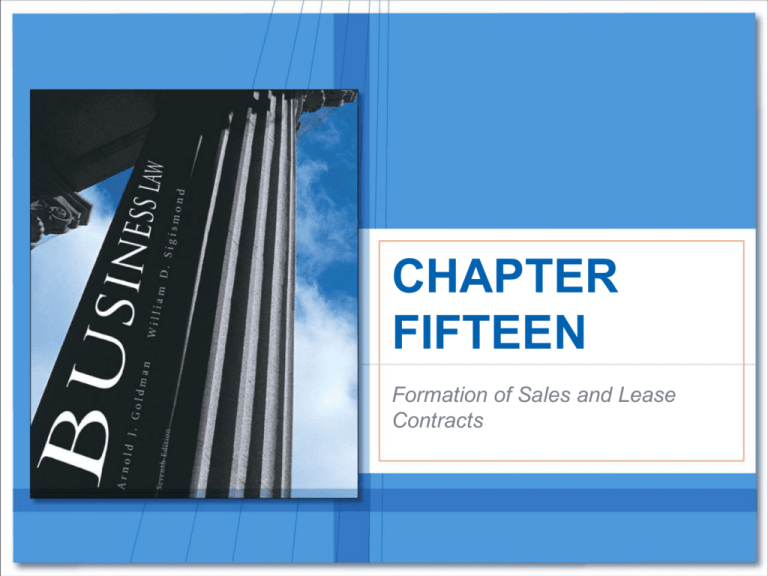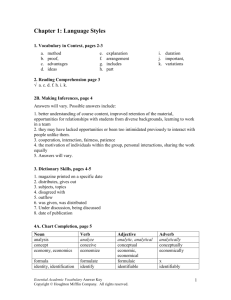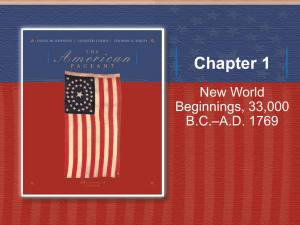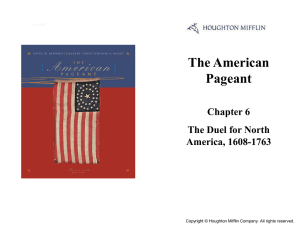
CHAPTER
FIFTEEN
Formation of Sales and Lease
Contracts
Sale of Goods
• Legally, the sale of goods is defined as the
sale of tangible, moveable personal property.
– Tangible means that the item for sale is
something that you can see, touch, and feel (for
example, items such as an automobile, boat,
book, etc.)
• Goods do not include intangible items such as a share
of stock.
– Moveable personal property refers to things other
than land or items permanently attached to the
land.
Copyright © Houghton Mifflin Company. All rights reserved.
15 | 2
Sale of Goods (continued)
• It is important to note the sale of a good
because when a good is bought and sold, the
Uniform Commercial Code (UCC) rules will
apply to the sale.
• When the sale of service also involves a good, it
is known as a mixed sale. The UCC will apply
when the primary purpose of the transaction is
the sale of the good.
Copyright © Houghton Mifflin Company. All rights reserved.
15 | 3
Sale of Goods
(continued)
• There are several items considered to be goods that
aren’t clearly within the previous definition.
• When the seller will sever the goods:
– Growing crops are goods.
– Timber to be cut is a good.
– Minerals, gas, and oil are goods.
– An item that can be easily detached from land and sold can be a
good.
• If the buyer will sever the timber or minerals these items
are not goods but real property.
– Real property law will govern the transaction.
Copyright © Houghton Mifflin Company. All rights reserved.
15 | 4
Merchant Versus Nonmerchant
• The UCC defines buyers and sellers of goods
into:
– Merchants: people who regularly deal in the sale of
goods. In some situations, the UCC will apply special
rules to merchants.
• Generally a retailer or wholesaler will be considered
merchants.
– Nonmerchant: occasional or casual sellers
Copyright © Houghton Mifflin Company. All rights reserved.
15 | 5
Formation of a Sales Contract
• The UCC does not change the essential
elements of contract formation:
– Offer and acceptance
– Consideration
– Competent parties
– Legal purpose
• The UCC has relaxed some of the technical
legal requirements found in the common law.
Copyright © Houghton Mifflin Company. All rights reserved.
15 | 6
Formation of a Sales Contract
(continued)
• The UCC has relaxed the mirror-image rule, which
required that the acceptance must exactly follow the
offer.
• The UCC focuses on allowing a contract to form as long
as the facts indicate the parties really intended to form a
contract.
• The UCC has provisions which allow filling in gaps the
parties may have left in forming the contract. Gap fillers
include:
– Inserting a price term
– Place and time for delivery
– Payment terms, etc.
Copyright © Houghton Mifflin Company. All rights reserved.
15 | 7
Formation of a Sales Contract
(continued)
• In relaxing the rules of contract formation the code did
add two requirements to minimize potential abuses:
– The parties must meet the obligations under the contract in
good faith (dealing honestly).
– If the parties are in a position of unequal bargaining power the
dominant party must avoid unfair dealings with the other party.
• If unfairness occurs a court could refuse to enforce the contract
because the contract was unconscionable.
Copyright © Houghton Mifflin Company. All rights reserved.
15 | 8
Firm Offer
• A firm offer under the UCC may not be revoked as long
the all following requirements are met:
–
–
–
–
The offer is for the sale of goods.
The offer is made by a merchant.
The offer is in writing and signed by the merchant.
The offer cannot be for a period of time longer than three
months.
• Under an option contract (discussed in Chapter 7) we
discussed paying consideration to keep an offer open.
• Under the UCC a firm offer modifies those rules.
Copyright © Houghton Mifflin Company. All rights reserved.
15 | 9
Acceptance
• When dealing at a distance, an acceptance under
the UCC can be transmitted by any reasonable
means in a business setting, unless the offeror
specifies a particular method of acceptance.
• In certain circumstances, the UCC will allow
acceptance by performance.
– Acceptance by shipping nonconforming goods is both an
acceptance and a breach of contract.
– If the seller states the shipment of nonconforming goods is
an accommodation, then it is regarded as a counteroffer
and not a breach.
Copyright © Houghton Mifflin Company. All rights reserved.
15 | 10
Battle of the Forms
• Modern commerce is often done by an exchange of
forms. An offer is sent out and confirmation of the order
is sent back by the seller.
– The terms in these forms can and do differ, a single set of terms
must be established to measure performance. Between
merchants, additional terms in the confirmation become part of
the contract unless:
• The offeror expressly gives notice to the offeree limiting acceptance
to the terms of the offer.
• The offeror gives notice to the offeree within a reasonable time
rejecting the additional terms.
• The new terms materially alter the contract (e.g., change in price).
Copyright © Houghton Mifflin Company. All rights reserved.
15 | 11
Consideration
• Under the UCC, the parties must still exchange
consideration.
• The parties can agree to modify the contract
consideration to be supplied by one party with
no change in the other party’s consideration, as
long as the change is made in good faith.
– This means the change is fair in the circumstances.
Copyright © Houghton Mifflin Company. All rights reserved.
15 | 12
Statute of Limitations
• The UCC sets a uniform statute of limitations for
the sale of goods of four (4) years.
• Although the UCC does allow the parties to
shorten the statute of limitations, it cannot be
set at period shorter than one (1) year.
Copyright © Houghton Mifflin Company. All rights reserved.
15 | 13
Statute of Frauds
• The UCC requires that a contract for the sale of
goods for $500 or more must be in writing.
– Proposed amendments to the UCC raise the $500 amount
to $5,000.
• The writing requirement at common law has been
relaxed under the UCC.
• Generally the writing must contain the following:
– Quantity and description of goods sold
– A writing signed by the party being sued to enforce the
contract
Copyright © Houghton Mifflin Company. All rights reserved.
15 | 14
Statute of Frauds
(continued)
• Exceptions to the statute of frauds (where an oral contract
will be enforced):
– The buyer receives and accepts the goods
• A partial acceptance will be enforced to the extent goods are
accepted.
– The buyer makes full payment for the goods.
– The buyer makes a part payment on the goods.
– Substantial steps have been taken toward the production
of goods made specially to order.
– There is admission of the contract in court testimony.
– There is written confirmation between merchants.
• The confirmation must be made within ten (10) days of
contract formation.
Copyright © Houghton Mifflin Company. All rights reserved.
15 | 15
Enforceable Oral Sales Contracts
•
•
•
•
•
•
Buyer receives and accepts the goods
Buyer makes full payment
Buyer makes a part payment for the goods
Specially manufactured goods
Admission in court of an oral contract
Written confirmation between merchants
Copyright © Houghton Mifflin Company. All rights reserved.
15 | 16
Parol Evidence Rule
• Contracts in writing stating a final agreement
can not be changed in court by parol evidence
– Can be presented to add meaning to unclear
language in a contract
• Evidence allowed from three sources – course
of dealing, course of performance, usage of
trade
Copyright © Houghton Mifflin Company. All rights reserved.
15 | 17
Formation of the Lease Contract
• UCC article 2A has been adopted in many
states to govern the leasing of goods.
• A lease is defined as a transfer of possession
and use of goods for a certain period of time:
• By a lessor (owner)
• To a lessee (renter)
• Based on consideration
Copyright © Houghton Mifflin Company. All rights reserved.
15 | 18
Types of Goods Leases
• There are two types of leases under the UCC.
– Consumer lease
• Made to lessee for personal, family or household usage
• Made by lessor who regularly engages in the business of
making leases
• A consumer lease’s payments cannot exceed a total of a
dollar limit set by state statute.
Copyright © Houghton Mifflin Company. All rights reserved.
15 | 19
Types of Goods Leases (continued)
– Finance lease
• Involves three parties instead of two
• One party leases or purchases the goods from the supplier
and then turns around and leases those goods to a third
party.
• Often the purpose of this type of lease is for the lessor to
provide financing for lessees lease of the goods provided by
a supplier.
Copyright © Houghton Mifflin Company. All rights reserved.
15 | 20
E-Sales Contracts
• With the advent of the Internet transacting business in
the virtual world has become a reality.
• E-Sales are more convenient, reduce paperwork, and
streamline business operations.
• Where possible traditional common law and UCC rules
will apply to these sales.
• However, experience has told us that new laws are also
necessary to operate in cyberspace.
– Thus, both federal and state governments are creating new laws
to assist in governing transactions in this new virtual medium.
Copyright © Houghton Mifflin Company. All rights reserved.
15 | 21
E-Sales Contracts (continued)
• An offer and acceptance can be exchanged via
e-mail, the Web, or other electronic methods.
• To ensure that offers and acceptances made
online cannot be challenged merchants need to
take steps to protect themselves:
– The contract in its entirety should be displayed
online.
– Terms such as price, payment terms, delivery
options, warranty, method of dispute, settlement, etc.
should all be clearly spelled out.
Copyright © Houghton Mifflin Company. All rights reserved.
15 | 22
E-Sales Contracts (continued)
• If selling over the Web:
– The sellers website should clearly spell out the terms
of the offer being made.
– Exactly what responses entered at the website
constitute acceptance need to be clearly stated.
– If you are using a click box on a website and it says “I
Agree” or “I Accept” there should be a notation that
tells the offeree they are accepting a binding
contract.
Copyright © Houghton Mifflin Company. All rights reserved.
15 | 23
E-Sales Contracts (continued)
• Electronic communications can be considered
to meet the writing requirement.
– Communications using tangible methods such as
telegraphed messages, telexes, Western Union
Mailgram and faxes meet the writing requirement.
– Postings on “chat lines,” electronic bulletin boards, or
e-mails kept in a computer log do not meet the
requirement of a writing.
Copyright © Houghton Mifflin Company. All rights reserved.
15 | 24
E-Sales Contracts (continued)
• Signatures: a merchant seller and consumer should
agree on the signature method.
– As discussed in Chapter 11, the law does provide means for
electronic signatures to be considered valid.
• Electronic Communication Errors
– Errors can and do happen in electronic communications.
– The legal solutions for issues of communication error will
depend upon the factual situation in which these errors
occurred.
Copyright © Houghton Mifflin Company. All rights reserved.
15 | 25



